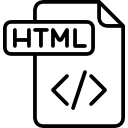HTML: Difference between revisions
Mr. MacKenty (talk | contribs) No edit summary |
Mr. MacKenty (talk | contribs) |
||
| Line 8: | Line 8: | ||
<iframe width="560" height="315" src="https://www.youtube.com/embed/wjkJaQYDxjQ" frameborder="0" allowfullscreen></iframe> | <iframe width="560" height="315" src="https://www.youtube.com/embed/wjkJaQYDxjQ" frameborder="0" allowfullscreen></iframe> | ||
</html> | </html> | ||
Content gratefully used with permission : <ref>http://cs50.tv/2015/fall/#license,psets</ref> | |||
==Basic ideas == | ==Basic ideas == | ||
Revision as of 07:49, 30 May 2016

HTML programming language[1]
HyperText Markup Language, commonly referred to as HTML, is the standard markup language used to create web pages. Along with CSS, and JavaScript, HTML is a cornerstone technology used to create web pages, as well as to create user interfaces for mobile and web applications. Web browsers can read HTML files and render them into visible or audible web pages. HTML describes the structure of a website semantically along with cues for presentation, making it a markup language, rather than a programming language.[2]
Introduction
Content gratefully used with permission : [3]
Basic ideas
- Programming in HTML
- Developing and saving
- Tags, Attributes and Elements
- Page Titles
- Paragraphs
- Headings: The six levels of headings.
- Lists: How to define ordered and unordered lists.
- Links: How to makes links to other pages, and elsewhere.
- Images: Adding something a bit more than tex
- Tables: How to use tabular data
- Forms: Text boxes and other user-input
Helpful resources
- Good site for choosing HTML colors
- Excellent reference for HTML
- W3 is an excellent site for learning HTML. It's really step-by-step.